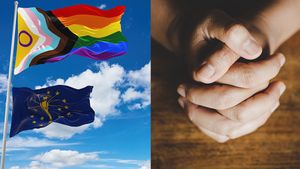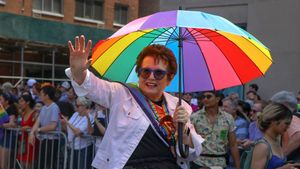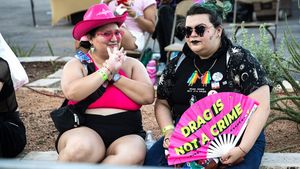Consumption-based content has not only become the most popular girl in school, but she's effectively walked in, stolen the attention of your crush, and become prom queen. Armed with social media tools like Instagram and Pinterest (yeah they're still kicking over there), the availability of all things related to consumption, read "foodie", has exploded. I can see what people are eating, where they're eating, what they're buying, and how to make 800 versions of a one-pot pasta recipe all within 5 minutes of scrolling through my Instagram feed. I love this, and I love the visibility that social media has brought to culinary experiences. Similarly, one of the many other areas of representation Instagram has signal boosted is queer content -- the representation of queer bodies and queer experiences. It is not news to us that social media platforms are giving queer people a space to exist without limit and have increased the visibility and representation of our community, but it is interesting to me to explore the relationship between food culture and queer culture, and how they have risen in tandem.
Related | The Culinary World Wants You to Stop and Eat the Roses
The advantage of excessive media sharing applies to every community from TV fan bases to niche hobbyists. "Foodies" and food-centric content falls in the forefront of this (you can't escape a #foodstagram) and I feel a connection between food and queerness is majorly based on the concept of nourishment. My queer identity and my food identity are pieces that fit together brilliantly, because my queerness informs my deep-rooted desire to nourish people in my general orbit. As a queer person, we are used to keeping close to our community where we can settle into time with our guard down, and where we can feel emotional nourishment. I wanted to explore the relationship between physical nourishment and emotional nourishment which led me to speak with Liz Alpern, the co-author of The Gelfite Manifesto and creator of Queer Soup Night, a Brooklyn based queer community event around, yes, soup.
I attended Queer Soup Night on the last Sunday in January and was met with one of those low-key-brings-tears-to-your-eyes dream moments: it was a space filled to the brim with full queer people (singles, friends, couples, families with children) queuing up around three huge pots of soup to choose from with soft hip hop in the background. People were catching up with their respective social circles and refueling for the week ahead. It was all a testament to nourishment that was both physical as well as emotional. I got to talk with Liz Alpern, post soup night, about the naissance and function of a queer event based around food:
"We started queer soup night as an activist outlet, a nourishing outlet, for us in a time when things felt dark and we felt like we needed to take action and food is my tool so it made sense to use food, but what ended up happening was my surprise that I finally got to merge these two identities -- I got to bring my passion for queer communities and my passion for food together into one space. And other than hanging out with my friends -- my queer friends -- over a meal, those two things had never interacted before. I am absolutely loving it -- it feels very...whole, to be doing something that brings these two identities together"
The narratives often put onto us by mainstream heteronormative society regarding queerness can be limiting at their best and offensive at their worst, which is why I have found a propensity to stick to my tribe -- other queer-identifying people. The emotional and mental nourishing that takes place in a queer dominated space leaves me feeling full because I do not have to guard myself and my identity. From the group chat check in to drinking too much tequila and dancing on tables at the club together, there is a nebulous hunger that is always satiated when I am around my people, or any queer people. Attending Queer Soup Night proved to me that my emotional hunger for engaging with other queer people is satisfied.
Regarding physical hunger, food has a different function in queer relationships. From going out to a nice meal together to going food shopping together, queer people have not been afforded the same privileges as The Straights. I have fielded things like the raised eyebrows from the waiter when they realize I'm not just out for a bite with a gal pal, but in fact on an anniversary date. I have gotten through the Uber driver kicking me and my partner and out of a car on our way to dinner reservations because we were holding hands. I have heard the snickers from the teenagers loitering in the grocery store parking lot as my partner and I run into the store for some eggs and milk.
The liberal bubble I am lucky enough to live in is still popped on occasions that are often so public facing, like going out to dinner, and these experiences shape my relationship with food. Thus, as I grow in my queerness, my culinary identity naturally evolves. The micro (and sometimes macro) aggressions faced in the public sphere of food have, in turn, brought advancements in my own food journey of cooking, tasting, learning, and experimenting -- all things I can do on my own terms, in my own space. The subsequent ability to share my experiences on social media, still on my own terms, has given me the ability to nature my passion for food in the exact ways I find engaging.
Instagram has changed this previously private experience for me. I can now connect on this social platform to other people who share my interests and I can see other queer people who have an interest in food like I do. I went through this same process coming into my own queer identity -- at first I had to do it privately, in my own space, but once I saw the vast and wide variety of others experiencing the same experiences -- I evolved, blossomed, and connected.






































































